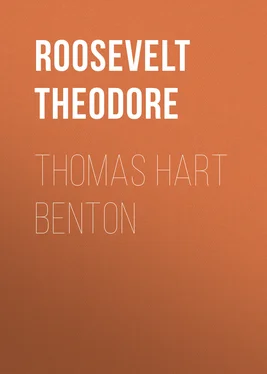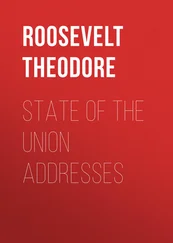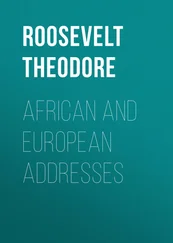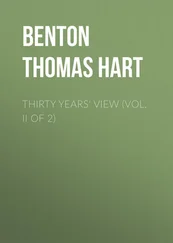Theodore Roosevelt - Thomas Hart Benton
Здесь есть возможность читать онлайн «Theodore Roosevelt - Thomas Hart Benton» — ознакомительный отрывок электронной книги совершенно бесплатно, а после прочтения отрывка купить полную версию. В некоторых случаях можно слушать аудио, скачать через торрент в формате fb2 и присутствует краткое содержание. Жанр: foreign_prose, История, foreign_edu, foreign_antique, на английском языке. Описание произведения, (предисловие) а так же отзывы посетителей доступны на портале библиотеки ЛибКат.
- Название:Thomas Hart Benton
- Автор:
- Жанр:
- Год:неизвестен
- ISBN:нет данных
- Рейтинг книги:4 / 5. Голосов: 1
-
Избранное:Добавить в избранное
- Отзывы:
-
Ваша оценка:
- 80
- 1
- 2
- 3
- 4
- 5
Thomas Hart Benton: краткое содержание, описание и аннотация
Предлагаем к чтению аннотацию, описание, краткое содержание или предисловие (зависит от того, что написал сам автор книги «Thomas Hart Benton»). Если вы не нашли необходимую информацию о книге — напишите в комментариях, мы постараемся отыскать её.
Thomas Hart Benton — читать онлайн ознакомительный отрывок
Ниже представлен текст книги, разбитый по страницам. Система сохранения места последней прочитанной страницы, позволяет с удобством читать онлайн бесплатно книгу «Thomas Hart Benton», без необходимости каждый раз заново искать на чём Вы остановились. Поставьте закладку, и сможете в любой момент перейти на страницу, на которой закончили чтение.
Интервал:
Закладка:
Jackson's administration derives a most unenviable notoriety as being the one under which the "spoils system" became, for the first time, grafted on the civil service of the nation; appointments and removals in the public service being made dependent upon political qualifications, and not, as hitherto, upon merit or capacity. Benton, to his honor, always stoutly opposed this system. It is unfair to assert that Jackson was the originator of this method of appointment; but he was certainly its foster-father, and more than any one else is responsible for its introduction into the affairs of the national government. Despite all the Eastern sneers at the "savages" of the West, it was from Eastern men that this most effective method of debauching political life came. The Jacksonian Democrats of the West, when they introduced it into the working of the federal government, simply copied the system which they found already firmly established by their Eastern allies in New York and Pennsylvania. For many years the course of politics throughout the country had been preparing and foreshadowing the advent of the "spoils system." The greatest single stroke in its favor had been done at the instigation of Crawford, when that scheming politician was seeking the presidency, and, to further his ends, he procured the passage by Congress of a law limiting the term of service of all public officials to four years, thus turning out of office all the fifty thousand public servants during each presidential term. This law has never been repealed, every low politician being vitally interested in keeping it as it is, and accordingly it is to be found on the statute-books at the present day; and though it has the company of some other very bad measures, it still remains very much the worst of all, as regards both the evil it has done and that which it is still doing. This four years' limitation law was passed without comment or protest, every one voting in its favor, its probable working not being comprehended in the least. Says Benton, who, with all his colleagues, voted for it: "The object of the law was to pass the disbursing officers every four years under the supervision of the appointing power, for the inspection of their accounts, in order that defaulters might be detected and dropped, while the faithful should be ascertained and continued.... It was found to operate contrary to its intent, and to have become the facile means of getting rid of faithful disbursing officers, instead of retaining them." New York has always had a low political standard, one or the other of its great party and factional organizations, and often both or all of them, being at all times most unlovely bodies of excessively unwholesome moral tone. Aaron Burr introduced the "spoils system" into her state affairs, and his methods were followed and improved upon by Marcy, Wright, Van Buren, and all the "Albany Regency." In 1829 these men found themselves an important constituent portion of the winning party, and immediately, by the help of the only too willing Jackson, proceeded to apply their system to affairs at Washington. It was about this time that, in the course of a debate in the Senate, Marcy gave utterance to the now notorious maxim, "To the victors belong the spoils."
Under Adams the non-partisan character of the public service had been guarded with a scrupulous care that could almost be called exaggerated. Indeed, Adams certainly went altogether too far in his non-partisanship when it came to appointing cabinet and other high officers, his views on such points being not only fantastic, but absolutely wrong. The colorless character of his administration was largely due to his having, in his anxiety to avoid blind and unreasoning adherence to party, committed the only less serious fault of paying too little heed to party; for a healthy party spirit is prerequisite to the performance of effective work in American political life. Adams was not elected purely for himself, but also on account of the men and the principles that he was supposed to represent; and when he partly surrounded himself with men of opposite principles, he just so far, though from the best of motives, betrayed his supporters, and rightly forfeited much of their confidence. But, under him, every public servant felt that, so long as he faithfully served the state, his position was secure, no matter what his political opinions might be.
With the incoming of the Jacksonians all this changed, and terribly for the worse. A perfect reign of terror ensued among the office-holders. In the first month of the new administration more removals took place than during all the previous administrations put together. Appointments were made with little or no attention to fitness, or even honesty, but solely because of personal or political services. Removals were not made in accordance with any known rule at all; the most frivolous pretexts were sufficient, if advanced by useful politicians who needed places already held by capable incumbents. Spying and tale-bearing became prominent features of official life, the meaner office-holders trying to save their own heads by denouncing others. The very best men were unceremoniously and causelessly dismissed; gray-headed clerks, who had been appointed by the earlier presidents,—by Washington, the elder Adams, and Jefferson,—being turned off at an hour's notice, although a quarter of a century's faithful work in the public service had unfitted them to earn their living elsewhere. Indeed, it was upon the best and most efficient men that the blow fell heaviest; the spies, tale-bearers, and tricksters often retained their positions. In 1829 the public service was, as it always had been, administered purely in the interest of the people; and the man who was styled the especial champion of the people dealt that service the heaviest blow it has ever received.
Benton himself always took a sound stand on the civil service question, although his partisanship led him at times to defend Jackson's course when he must have known well that it was indefensible. He viewed with the greatest alarm and hostility the growth of the "spoils system," and early introduced, as chairman of a special committee, a bill to repeal the harmful four years' limitation act. In discussing this proposed bill afterwards, he wrote, in words that apply as much at this time as they did then: "The expiration of the four years' term came to be considered as the termination and vacation of all the offices on which it fell, and the creation of vacancies to be filled at the option of the president. The bill to remedy this defect gave legal effect to the original intention of the law by confining the vacation of office to actual defaulters. The power of the president to dismiss civil officers was not attempted to be curtailed, but the restraints of responsibility were placed upon its exercise by requiring the cause of dismission to be communicated to Congress in each case. The section of the bill to that effect was in these words: That in all nominations made by the president to the Senate, to fill vacancies occasioned by an exercise of the president's power to remove from office, the fact of the removal shall be stated to the Senate at the same time that the nomination is made, with a statement of the reasons for which such officer may have been removed. This was intended to operate as a restraint upon removals without cause."
In the "Thirty Years' View" he again writes, in language which would be appropriate from every advanced civil service reformer of the present day, that is, from every disinterested man who has studied the workings of the "spoils system" with any intelligence:—
I consider "sweeping" removals, as now practiced by both parties, a great political evil in our country, injurious to individuals, to the public service, to the purity of elections, and to the harmony and union of the people. Certainly no individual has a right to an office; no one has an estate or property in a public employment; but when a mere ministerial worker in a subordinate station has learned its duties by experience and approved his fidelity by his conduct, it is an injury to the public service to exchange him for a novice whose only title to the place may be a political badge or partisan service. It is exchanging experience for inexperience, tried ability for untried, and destroying the incentive to good conduct by destroying its reward. To the party displaced it is an injury, he having become a proficient in that business, expecting to remain in it during good behavior, and finding it difficult, at an advanced age, and with fixed habits, to begin a new career in some new walk of life. It converts elections into scrambles for office, and degrades the government into an office for rewards and punishments; and divides the people of the Union into two adverse parties, each in its turn, and as it becomes dominant, to strip and proscribe the other.
Читать дальшеИнтервал:
Закладка:
Похожие книги на «Thomas Hart Benton»
Представляем Вашему вниманию похожие книги на «Thomas Hart Benton» списком для выбора. Мы отобрали схожую по названию и смыслу литературу в надежде предоставить читателям больше вариантов отыскать новые, интересные, ещё непрочитанные произведения.
Обсуждение, отзывы о книге «Thomas Hart Benton» и просто собственные мнения читателей. Оставьте ваши комментарии, напишите, что Вы думаете о произведении, его смысле или главных героях. Укажите что конкретно понравилось, а что нет, и почему Вы так считаете.












